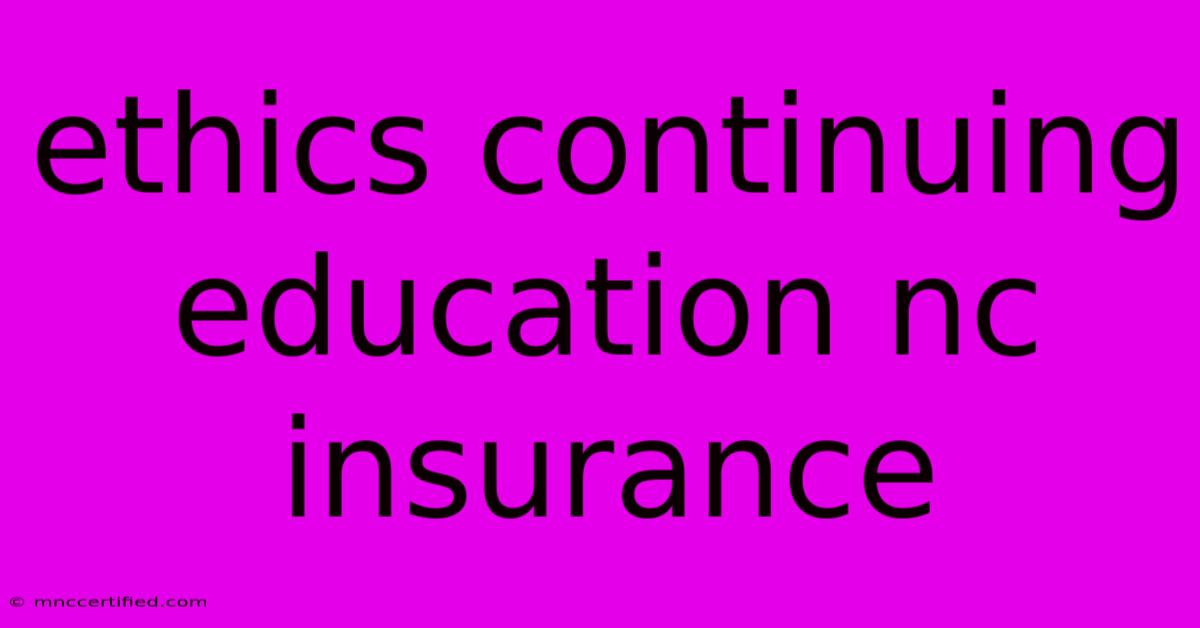Ethics Continuing Education Nc Insurance

Table of Contents
Navigating the Ethical Landscape: Continuing Education for NC Insurance Professionals
In the ever-evolving world of insurance, staying informed and ethical is not just a suggestion, it's a necessity. For licensed insurance professionals in North Carolina, continuing education (CE) plays a crucial role in maintaining ethical standards, ensuring compliance, and protecting the public.
Why is Continuing Education Important for NC Insurance Professionals?
- Maintain License: Completing the required CE hours is mandatory to renew your insurance license in North Carolina. Failure to do so can result in license suspension or revocation.
- Stay Updated: The insurance industry is constantly evolving. CE courses help you stay abreast of new regulations, laws, and best practices.
- Sharpen Skills: By expanding your knowledge base, you can improve your skills, increase your value to your clients, and enhance your professional development.
- Promote Ethical Conduct: CE courses often incorporate ethical dilemmas and case studies, reinforcing the importance of upholding the highest ethical standards in your practice.
What are the CE Requirements for NC Insurance Professionals?
The specific CE requirements vary based on your license type and whether you are a resident or non-resident of North Carolina. You can find detailed information on the North Carolina Department of Insurance website.
Where to Find CE Courses:
- Approved Education Providers: The North Carolina Department of Insurance maintains a list of approved CE providers. Look for reputable providers that offer courses relevant to your specific license and area of expertise.
- Professional Associations: Organizations like the National Association of Insurance Agents (NAIA) and the Council of Insurance Agents & Brokers (CIAB) offer valuable CE courses and webinars.
- Online Platforms: Numerous online learning platforms offer convenient and flexible CE options for insurance professionals.
- Colleges and Universities: Some institutions offer CE courses through their continuing education programs.
Tips for Choosing the Right CE Courses:
- Align with Your Needs: Select courses that directly relate to your current practice, areas of focus, and future career goals.
- Check for Approvals: Ensure the provider and courses are approved by the North Carolina Department of Insurance.
- Seek Out Variety: Explore different formats such as online courses, webinars, in-person workshops, or a combination of these.
- Consider Your Learning Style: Choose courses that match your preferred learning methods (e.g., interactive, lecture-based, case studies).
Ethical Considerations in Insurance:
- Confidentiality: Protecting the privacy and confidentiality of client information is paramount.
- Transparency: Being honest and upfront with clients about policies, premiums, and potential risks is essential.
- Fairness: Treating all clients fairly and equitably, regardless of their background or circumstances.
- Professionalism: Maintaining a high level of professionalism in all interactions with clients, colleagues, and the public.
Beyond Compliance:
CE is more than just meeting the requirements. It's a commitment to professional growth and ethical conduct that strengthens your reputation, builds trust with clients, and ensures your success in the insurance industry.

Thank you for visiting our website wich cover about Ethics Continuing Education Nc Insurance. We hope the information provided has been useful to you. Feel free to contact us if you have any questions or need further assistance. See you next time and dont miss to bookmark.
Featured Posts
-
Final Fantasy Trading Card Game Card List
Nov 07, 2024
-
Breakingviews Musk Vs Trump A Political Clash
Nov 07, 2024
-
Insurance Requirements For Owner Operators
Nov 07, 2024
-
How To Get A 10 000 Surety Bond In Texas
Nov 07, 2024
-
Does Homeowners Insurance Cover Electrical
Nov 07, 2024